Hiking Spain’s wild coast
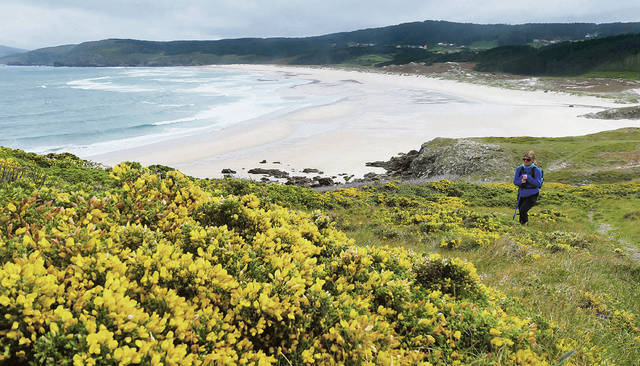
SAN DIEGO UNION-TRIBUNE
The hiking trail runs along deserted beaches and hillsides covered with brilliant yellow gorse flowers.
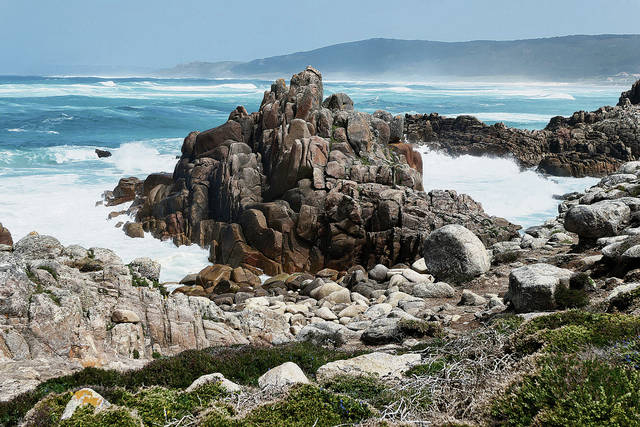
SAN DIEGO UNION-TRIBUNE
When the trail neared the coast, we marveled at the power of the Atlantic Ocean’s waves as they crashing against the rocky outcrops.
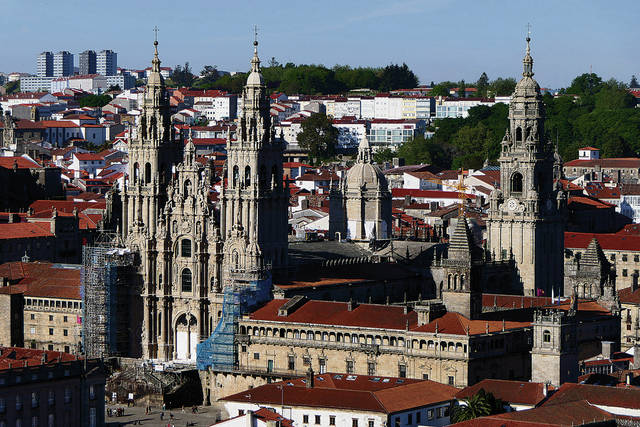
SAN DIEGO UNION-TRIBUNE
Santiago de Compostela’s cathedral is the destination for thousands of pilgrims each year.
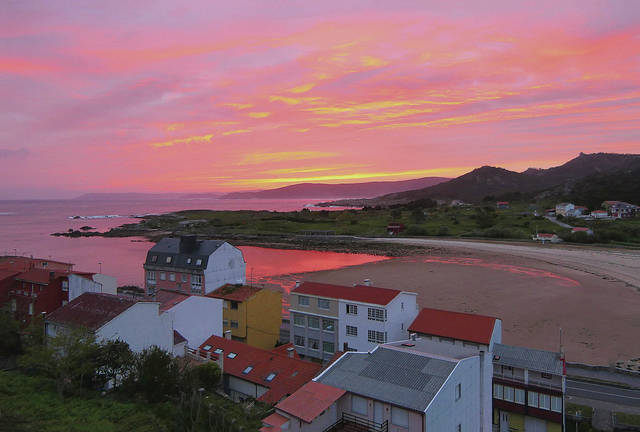
SAN DIEGO UNION-TRIBUNE
The sun sets on the fishing village of Camelle, Spain.
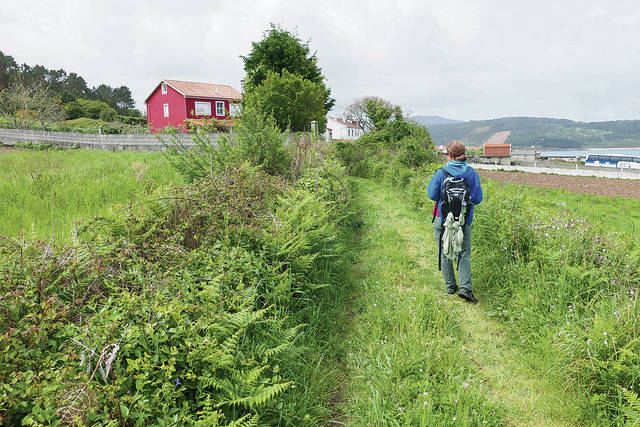
SAN DIEGO UNION-TRIBUNE
Each day we hiked on a variety of trails, including wide, grassy paths and narrow rocky trails.





Serendipity — an unexpected delight — is the word that comes to mind when describing the seven-day hike my wife and I recently did in the wild and undeveloped northwest coast of Galicia, Spain. Simply put, anyone who is adventurous, loves traveling to Europe and is fit enough to do 10-mile hikes should seriously consider doing this.
Before this experience, I had never heard about On Foot Holidays’ programs that allow hikers to go at their own pace, with maps and detailed hiking instructions, but without a guide or other travelers, while still enjoying a high level of local support. What initially caught my attention was an announcement about On Foot Holidays’ newest hike, the Lighthouse Way or “Camino dos Faros,” which they accurately described as a journey along “the last unspoilt coast of Europe.” Although the company has packaged nearly three dozen tantalizing hiking routes in 13 European countries, including Spain, Greece and Italy, this particular hike sounded both challenging and rewarding enough to warrant a try. The company offered 10-day, seven-day or five-day routes for this hike, so we opted for seven days which proved to be the right amount of time and distance for us. Afterward, my wife and I agreed this unique experience is one we will always remember and treasure.
So what made the hike so special?
Organization
On Foot Holidays provided us an extensive pretrip package containing a custom-written guidebook about the region and our hike, a set of detailed trail descriptions and maps for each day’s route. In addition, they booked our lodging each night and arranged for a taxi to take our baggage to the next destination, so all we had to do was carry our daypack essentials. Each day we texted or spoke with the company’s local expert who was available in case of emergency, but whose main function was to keep us informed about the daily weather forecast and to make special taxi arrangements when we opted to shorten a couple of 14-mile hikes to less than 10 miles (a very nice and much-appreciated option since my feet protested going more than 10 miles). We found the cost was very reasonable considering the meals, lodging and transportation that the company provided.
Don't miss out on what's happening!
Stay in touch with breaking news, as it happens, conveniently in your email inbox. It's FREE!
IF YOU GO: GALICIA, SPAIN
>> Getting there: British Airways, 800-247-9297
>> Hiking tour: On Foot Holidays, phone, +44 (0) 1722 322652; email, walks@onfootholidays.co.uk
Getting there
We decided to splurge on business-class seating for our British Air flight to Madrid, knowing that after an overnight flight we would feel refreshed for our hike. Having access to the British Air lounge made our Heathrow layover a pleasure, as did the fully reclining seats and deluxe meals we savored on the long transAtlantic flight.
The hiking
The variety of the trails and scenery made every hike a delight. Single- track trails in grassy meadows soon became double tracks that paralleled a wide bay before heading through pine and eucalyptus forests cloaked in rich, green ferns. One of our hikes followed a narrow trail along a steep, rocky cliff overlooking the steel-blue waters of the Atlantic Ocean that thrashed against jagged rocks hundreds of feet below us.
We stopped to picnic and watch the only living things we saw that whole day: a herd of goats above us, and a group of dolphins cavorting in the waves below. In the distance, many of the mountain peaks sported gleaming wind turbines like candles on a cake. Later that same trail led across a 2-mile long, curving sandy beach with nary a soul, nor structure, in sight before leading onward through rich farmland.
Before long, we stopped at a small village cafe that served Estrella Galicia beer and freshly baked bread with cold cuts for less than $2. While we did get lost briefly a couple of times, in general the instructions were adequate, and the trails were amply marked with the official “Camino dos Faros” green dots, arrows or little feet pointing the way.
Sights and sounds
During our mid-May journey, the profusion of flowers delighted us as we admired the intricate designs and colors of stately, purple foxgloves, dazzling yellow gorse (the spiny national flower of Galicia, covering entire hillsides), white daisies, and countless others. The ocean, however, was the star of the show. I felt diminutive in the presence of the Atlantic’s powerful swells that rolled toward the shore in a steady procession from some unseen place, cresting and breaking with a ferocious intensity.
A sad reminder of that oceanic power appeared in the gray mist, halfway through a long coastal hike — the English Cemetery, where 172 of 175 British sailors, whose ship sank in 1890, were buried on this aptly named “Costa da Morte” or coast of death. In fact, the name of our hike, the Lighthouse Way, derives from the series of lighthouses built along this treacherous coast.
Silence and solitude were the hallmarks of each day’s sojourn. The only sounds we heard were birds chirping, the wind blowing through trees or the waves breaking against the shoreline. The air was clean and the temperature brisk, with frequent intervals of cloudy, cool, windy and rainy weather interspersed with glorious bursts of sunshine. There was remarkably little litter, the exception being spots along the shore where ocean currents deposited mostly fishing items.
People and food
Staying in pleasant small towns and villages that we would have never otherwise visited made our hike extra special. We noticed that virtually all homes were well-kept and neatly painted, mostly in shades of white with some in baby blue, light green or yellow hues that blended with their red tile roofs. While walking past rural homes, I was intrigued by the striking Galician rectangular, stone structures, called “horreos,” perched on top of mushroom-shaped stone pedestals, used for centuries to store grain for livestock during winter months.
We found the local people to be friendly, welcoming and honest; in one small shop I asked the owner which bottle of Albarino wine he recommended, whereupon he took away my $9 bottle and replaced it with a $3.5 euro bottle, explaining that it was much better. Where else would that happen? During a sudden rainshower a man invited us into his home for tea or coffee. In Santiago, a woman walked a block out of her way to show us where to go.
While Galicia is famed for its seafood, the menus focus mainly on octopus, various types of shellfish, and their coveted delicacy, barnacles. The local beer was good, but we relished the ubiquitous fresh breads and cheeses. In the morning, we always had freshly squeezed orange juice; one of our hosts claimed the juice wasn’t as good unless it was hand-squeezed. Being a fan of white wine, I was happy to find the majority of local wines were white varieties that tasted great and cost between $2 and $5.
Pilgrims and El Camino
Although our hike was generally not part of the renowned walk called El Camino de Santiago, there were stretches where both trails overlapped, combining our green marks and the blue and yellow Camino trail signs with the scallop shell motif. Before and after our hike we spent a night in Santiago, the destination each year for tens of thousands of pilgrims (both religious and nonreligious hikers). Coming from around the world, most of them appeared to be over 50 and had walked an average of 500 miles to reach that holy place. As small groups of hikers reached the main plaza of Santiago’s ancient cathedral, they often cried, hugged and took lots of photos of themselves with their large backpacks, worn hiking boots and walking staffs. A day or two in Santiago is a must.
Most of the pilgrims I spoke with said that walking the Camino had changed their lives in profound ways.
What I realized on our much shorter hike was that I could allow myself to slow down, appreciate the beauty around me, and let go of the urge to power walk from point A to point B. My wife and I realized that we, too, are pilgrims searching for meaning, awareness and joy on our journey through life and our Galician hiking experience had moved us further down that path in ways we won’t forget.




